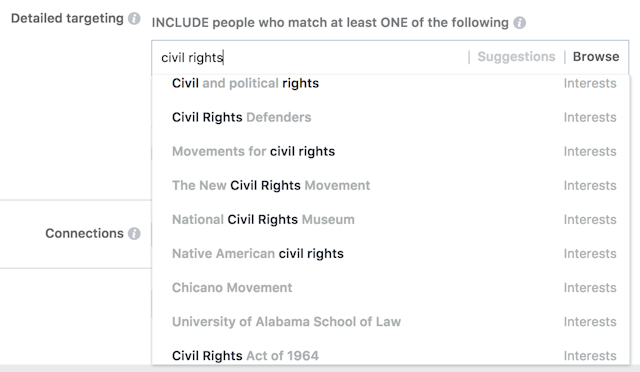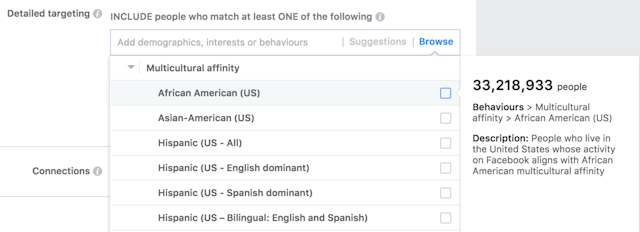The very scary political power of Facebook advertising
In what seems to be the never-ending investigation into how America (and Russia) elected someone as insert term of your choice* as Donald Trump into power, Facebook ads has recently taken the spotlight.

Trump spent the majority of his digital campaign budget on Facebook ads (more than $150m in the final weeks of the campaign, with the digital director of the presidential campaign stating that there were more than 50,000 ad variants per day. The campaign had a support team from Facebook (and Russia) to run at this scale, but what targeting options do Facebook make available to advertisers that could be used for political purposes?
Basic Demographics
While these aren’t all specifically for political purposes and should be utilised by advertisers to reach a relevant audience, Age, Sex and Location can be used to tailor messaging for specific purposes. These become increasingly effective when coupled with interest targeting (we’ll get to that later).

The above image shows how detailed targeting can be for locations. While you can target an area as specific as a postal code, you can also target congressional districts. This obviously seems to be specifically for political purposes and would be of great use for political campaigns both locally and nationally.
Detailed Targeting
What makes Facebook such a powerful advertising tool is the information users willingly (but maybe unknowingly) give away while using it. Most of this becomes available to advertisers in the form of detailed targeting. There is an absolute wealth of targeting options that are available to advertisers, but I’ll show three examples that are relevant to politics.
Politics (US)
Well this is certainly an obvious one to start with. The targeting options allow an advertiser to target based on the following options:

The targeting covers each side of the political scale, and also gives the option to target users based on their engagement with content and whether they are likely to engage and distribute it. This becomes extremely useful when trying to spread information (or misinformation as seen in the 2016 political campaign) about a campaign ideas or political opponents.
Politics and Social Issues
A second very powerful targeting option for political campaigns is the politics and social issues targeting abilities. This allows an advertiser to target based on a pre-defined set of issues.

While the set of political and social issues are pre-defined, a search for rights movements also display more targeting options which are relevant to politics:


These issues are very common themes in political debates and are issues that people are likely to have strong emotions about. So, this targeting option becomes a very powerful tool in the arsenal, which allows an advertiser to get across their message or stance on specific, emotive subjects.
Multicultural Affinity
As there tends to be specific focus on race and cultural issues during American political campaigns, Facebook can target the below segments.

As well as targeting these groups to expand their support, Trump’s campaign actively targeted African Americans in hope of suppressing their vote. This was done by targeting this audience and delivering ads that showed Hilary Clinton describing some African American males as “Super Predators”. This was admitted in a Business Week article, by a senior official stated that they had three major voter suppression campaigns among different audiences.
The future of Facebook and politics
The last American presidential election showed how powerful a tool that Facebook was in the fight for the White House. In an interview with CBS Trump’s digital director even said “Twitter is how [Trump] talked to the people, Facebook was going to be how he won.”
However, the election also showed how dangerous a tool Facebook can be if not used responsibly. Before Trump hijacked the term ‘Fake News’ to describe negative news about himself, it was used to describe the often ridiculous stories that were being spread by right wing propaganda sites about the Clintons (e.g. Pizzagate, a conspiracy that claimed the Clintons ran a paedophile ring from the basement of a Pizza shop).
I’ve shown just a few examples of targeting options that seem to be politically motivated and if used correctly, can be extremely powerful. As advertisers are held to standards about what they can say, should politicians be held to the same? With the vast amounts of money spent on Facebook for political ads and a marked increase in the use of digital for the 2017 General Election, it’s unlikely we’re going to see Facebook try to curb down on it’s platform’s influence on politics anytime soon.
* unqualified, racist, sexist, misogynistic, crooked, divisive, destructive, moronic – you get the point.
Paul Hunter is marketing manager at Liberty Marketing.
Content by The Drum Network member:

Liberty Marketing
Liberty was founded in 2008, when online marketing was still an untamed frontier.
Dodgy digital marketers roamed the web unchecked and businesses big and...
